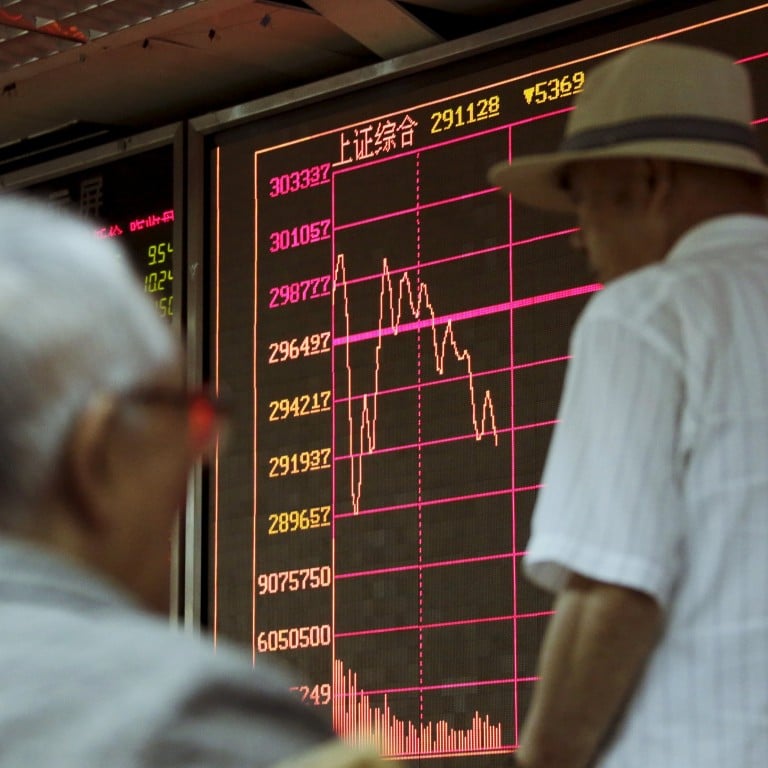
Will the anti-corruption campaign slow China’s financial reforms?
The market turmoil since mid-summer has brought a fresh impetus to China’s anti-corruption campaign, with bankers, journalists and now a high-profile financial regulator, Zhang Yujun, under the bright lights of interrogation.
To cynics, this confirms that the “tigers and flies” campaign is not just about corruption. It is a leviathan that serves a range of political purposes -- in this case finding scapegoats for the market crash, in other cases weeding out ideological opponents or other enemies, punishing the outspoken or insufficiently patriotic, or grabbing power back to the centre to satisfy President Xi Jinping’s megalomania.
A few days ago I had an interesting email interview with William Overholt, a regional expert and long-time investment adviser who is currently a senior fellow at the Harvard University Asia Center. I contacted him because he is a believer – an observer who thinks the anti-corruption campaign is genuine, brave and critical to the country’s ongoing economic transition.
“Those who characterize the anti-corruption campaign as pure factional struggle just don't understand Chinese politics,” Overholt said. “The need for a campaign against corruption was a consensus, including among those whose followers are being hit.”
The cynics also misunderstand the motives of the key participants. “Wang Qishan, the leader of the anti-corruption campaign, is a brilliant economic manager who burns with patriotism,” he added.
In a recent article in the East Asia Forum Quarterly, Overholt explained why corruption in China did not hold back development or economic potential as in other Asian countries, such as India or the Philippines.
China has traditionally specialised in “graft” – which is when officials take kickbacks as they execute their duties, such as the construction of highways. They enrich themselves, but they also make good highways. If not, they lose their positions.
Corruption is when public funds are pillaged to the point where there is no money left to execute duties – quality highways do not get built, nor power plants, ports or rail lines.
The problem is that malfeasance got way out of hand under the administration of Hu Jintao and Wen Jiabao. That era was focused on maximizing growth, spearheaded by massive investment spending, which favoured state enterprises.
Then came the explosion of stimulus after the Global Financial Crisis, giving bureaucrats and their families the opportunity to make millions if not billions. “The scale of graft became astronomic,” Overholt wrote.
Moreover, the nature of graft began to change. Instead of skimming off the top while still meeting the everyday goals of nation-building, officials began to focus only on making money, to the detriment of the country’s future.
Forward-looking Communist Party stalwarts realised a new direction would need to be forged, one that would thwart the “old economy” representatives who gained power in the Hu-Wen era. As an example the petroleum faction, led by Zhou Yongkang, who has since been purged.
A strong centre was needed to enact economic reforms, clean up the environment, restructure state-owned enterprises and blast open pathways for small and medium enterprises to help strengthen a new, more competitive and services-based economy going forward.
Xi Jinping did not grab power in some Maoist or Machiavellian manoeuvre. He was advanced through normal Party mechanisms, because his charisma could provide a populist bulwark against entrenched interests that would thwart the corruption crackdown or the pro-market reforms.
Yet China’s current leadership clearly hasn’t acted as vigorously on economic reform as it has on anti-corruption. The promised SOE reforms have been particularly underwhelming.
In Overholt's view, one issue is that almost no one in government is clean. Thus those enacting economic reforms face the risk that they will upset others -- who will seek revenge by going public with the past sins of the reformer.
“President Xi must resolve the paradox that the anti-corruption campaign is prerequisite to economic reform, but at the same time inhibits immediate reform,” Overholt said.
There has been much more momentum on the financial front, however, with a bevy of initiatives ranging from the liberalisation of interest rates to the internationalisation of the renminbi. In retrospect, some of the financial reforms, including the relaxation on margin financing, are blamed for having spurred the stock market bubble.
Now with the market crash -- and the high-ranking Zhang under investigation for “severe violation of discipline,” a code word for corruption -- cynics must wonder if financial reforms will also stall.
Cathy Holcombe is a Hong Kong-based financial writer

